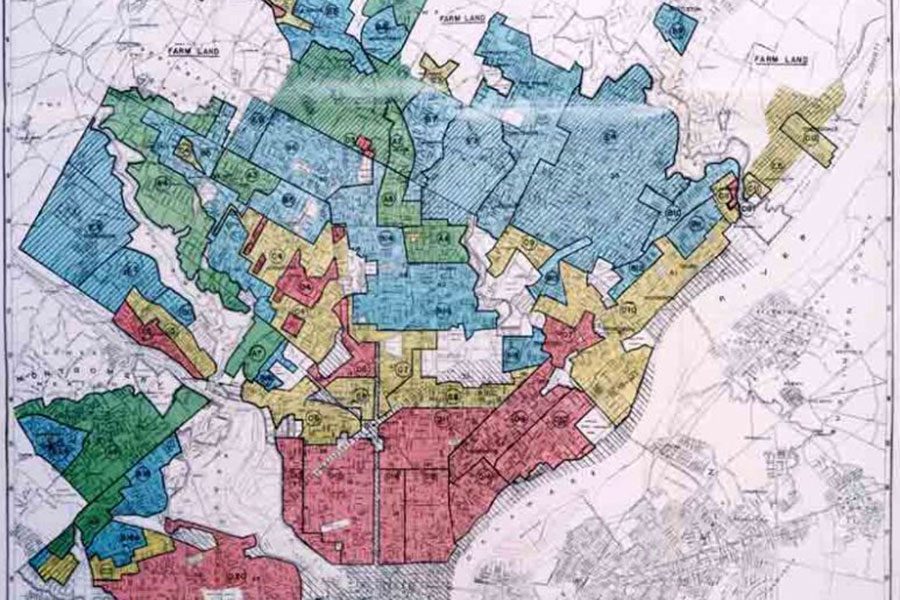I’m a Democrat…and I agree with Ben Carson
Redlining was used for decades to decide where the FHA and VA would ensure loans. Houses in areas with African American residents usually did not qualify. This policy was blatantly unconstitutional because it made African Americans second class citizens.
October 1, 2018
In this era of extreme political polarization, it is important to be able to recognize when an opponent introduces a motion that deserves bipartisan support.
Last month, Ben Carson made an appeal to American cities and towns to reduce neighborhood zoning regulations (rules that restrict what types of housing can be built in a neighborhood). In terms of political initiatives and controversies, this act appears to be relatively minor, but it is surprising coming from the Trump Administration. As the Secretary of Housing and Urban Development, Carson knows that zoning not only has a negative effect on low income people, but that it is also detrimental for the greater economy.
Neighborhood zoning has a problematic history. City zoning and neighborhood covenants emerged after WWII, when they were used by developers to create ethnically homogeneous housing developments, which was required to qualify for Federal Housing Administration (FHA) loans. As de jure racism declined in the following decades, the classist role of zoning became more significant, and since income inequality is now the highest it’s been since the 1920s, the relationship between race and poverty is more consequential than ever.
Considering that both Carson and Senator Cory Booker of New Jersey, among others, have expressed opposition to exclusionary zoning, it is not a partisan issue, it is a class one. Middle class homeowners on both sides of the aisle tend to favor the policy to protect home and school values. These policies drive up home prices and create an unnecessary and elitist housing crisis. Most importantly, economically diverse neighborhoods tend to have better academic outcomes for low income students. This is due to increased funding for schools, less crime, and better role models (among other things). Unfortunately, in the 20 year period between 1990 and 2010, economic segregation by neighborhood has increased by 20%.
However, this is not just an issue that pertains to low income workers or their families. High poverty neighborhoods often have a lot of crime as well, and many criminologists agree that since crime spreads like an epidemic, it can quickly infiltrate middle class and high income neighborhoods.
Officials also have a constitutional obligation to address this issue. Amendment XIV Section I of the Constitution reads “All persons born or naturalized in the United States and subject to the jurisdiction thereof, are citizens of the United States and of the State wherein they reside. No State shall make or enforce any law which shall abridge the privileges or immunities of citizens of the United States; nor shall any State deprive any person of life, liberty, or property, without due process of law; nor deny to any person within its jurisdiction the equal protection of the laws.” Yet, beginning in the 1930s and continuing in the post-war era, federal programs intentionally segregated African Americans. This is where it all comes back to the FHA, which used federal funds to insure home mortgage loans for white people, and provided financial backing for post WWII building projects, on the condition that they were only for white people. Not only did this “abridge the privileges or immunities of citizens of the United States,” it also infringed on the personal property rights of both White and African American citizens.
How does this give politicians a constitutional obligation to address economic segregation? The average African American household makes 61 cents on the dollar compared to a white family. Black people are disproportionately poor. By reversing the trend of economic segregation, the government would be working to make amends for decades of unconstitutional actions.
However, perhaps the most moving argument for economic integration is that current trends are adverse to the democratic values of American society. In time when more and more people are concerned not only about political polarization, but about social polarization, divisions between demographic groups must not be ignored. The founding principle of democracy is that all adults, regardless of race, income, gender, etc, have an equal vote – and an equal voice – in government and society. Economic desegregation is not a zero sum game, but that does not mean there wouldn’t be sacrifices. Those who live in middle upper class neighborhoods will likely be uncomfortable, and there may be some damage to home values. However, this is a small price to pay for rejecting an unconstitutional past, giving kids more opportunity, and creating a more cohesive society.
Issues regarding economic segregation can be found in our own communities. The funding and academic rigour of local high schools vary, often in correlation with median income. For instance, Nashua North’s AP participation rate is 32%, while South’s is 31%. The district wide average for college readiness is 24.7. This is important because Nashua High Schools North and South have 42% and 37% free or reduced lunch program participation respectively. AP participation and college readiness scores are significantly higher at smaller, better funded, high schools in towns surrounding Nashua. It is very important to recognize those such as myself who benefit from these inequalities, and those who are at a disadvantage. Wouldn’t it be more conducive to the learning environment if there was more diversity in racial and neighborhood experience?
The economic trends can be depressing, but new generations can provide hope. The millennial generation is motivated to invest in, buy from, and work for socially conscious companies, even when it comes at a financial cost. If they are willing to make these sacrifices for the betterment of society, who is to say they won’t support economic integration? Either way, this cannot happen if those intending to make improvements aren’t aware of the issue. This is where Ben Carson comes in. The Secretary of Housing and Urban Development is hardly a bully pulpit, but he does have the opportunity to reach lots of people, and because he is a republican, those on the right are more willing to listen. That being said, Ben Carson has certainly made mistakes and decisions that have been quite alarming. Still, when someone on the other side of the political spectrum introduces an idea, it must be supported based purely on its merit, not the character of its advocates.














![Students in Archaeology use tools in a mock excavation. As a class that focuses on hands-on learning, students are able to gain crucial life skills. “[The class] is more hands-on than I thought, and I'm learning way more with physical activities than I do in the classroom,” said student Tess Brown ‘25.](https://cavchronline.com/wp-content/uploads/2024/11/IMG_8390-e1733078359165-278x300.jpg)
